Masterclass on Artificial Intelligence at the Service of Business: An Overview
The first masterclass on "Artificial Intelligence (AI) at the Service of Business", organized by LFM University with the supervision and coordination of YeSeul Kim, Isabella Lazzini and Massimo Bullo, was held on 6 and 7 October and was a very successful event thanks to the topic covered and the variety of speakers who attended. Coming from all over the world, leading experts in the AI sector offered valuable insights and touched various aspects of this revolutionary technology providing a 360° view. The practical "hands on" session of the masterclass, with the relative final assessment by the judges Lazzini, Bullo, Giomo, contributed to making the training experience even more interactive and useful. In this article we will review some of the main topics covered by our professors and the highlights of the course.
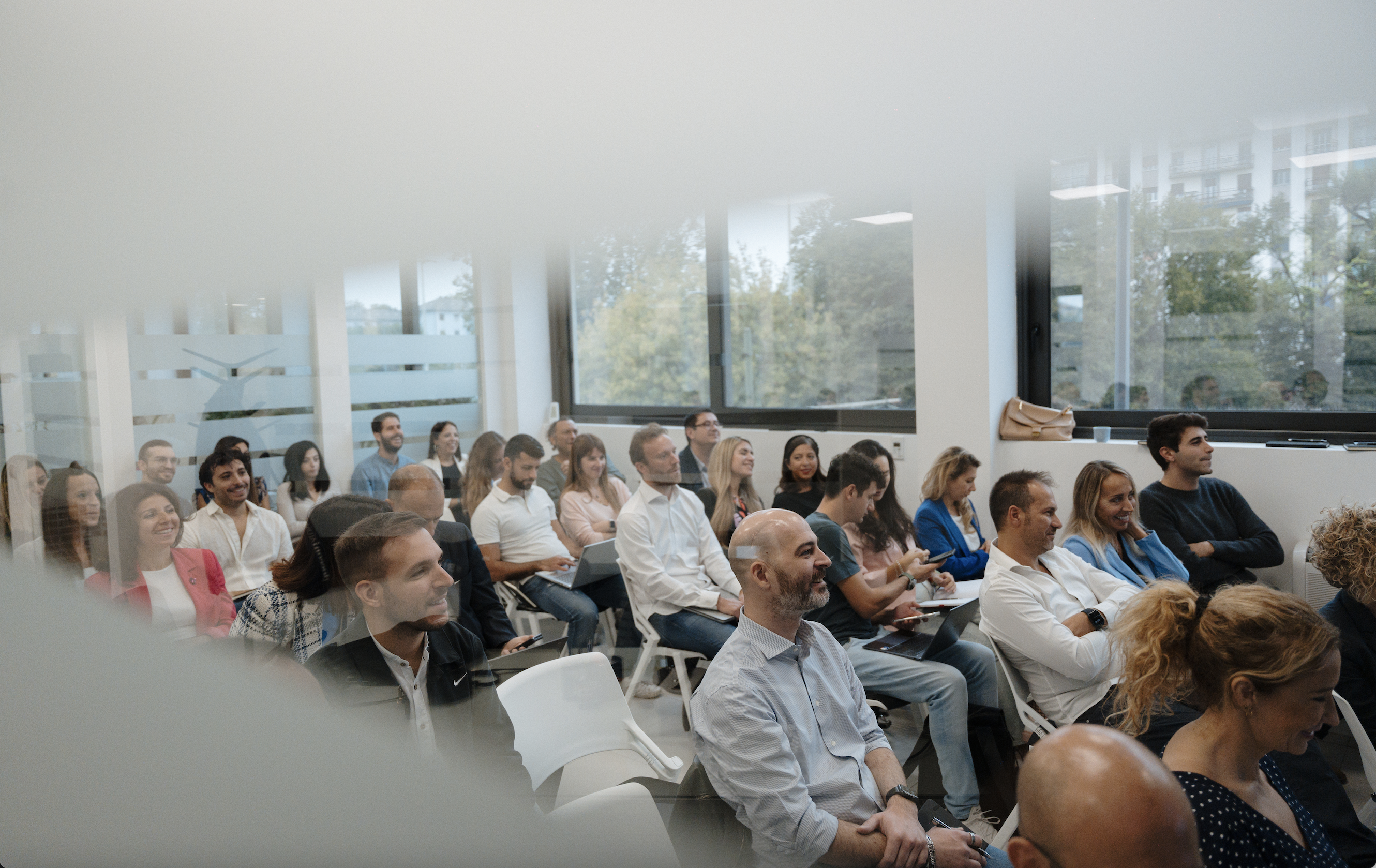
Mariella Borghi and the intro on AI and its definitions and subcategories
Mariella Borghi, one of the prominent names of the event, whose background we have extensively covered in previous articles on our blog, provided a detailed overview of the different types of artificial intelligence. He took the audience on a beautiful narrative journey in which he explained the various definitions of AI and the difference between the three large macro clusters of Artificial Intelligence: ANI, AGI and ASI.
1. ANI (Artificial Narrow Intelligence): it is a form of AI specialized in a specific task, such as recognizing images or translating texts, it is that form of artificial intelligence capable of carrying out repetitive activities in a specific area, based on a set of rules defined with the aim of solving a specific problem. This category includes things like facial recognition, chatbots, voice assistants and GPT chat itself.
2. AGI (Artificial General Intelligence): represents a form of AI that can carry out any intellectual activity at a human level, in fact in this regard we speak of Machine intelligence, where the machine is equipped with a real conscious intelligence, i.e. an intelligence that imitates the human ability to think, understand, learn, reason and consequently apply his intelligence to solve any problem as humans do in any situation.
3. ASI (Artificial Super Intelligence): is a type of AI that surpasses the cognitive capabilities of human beings in almost all aspects. In this regard, we speak of Machine Consciousness, or a situation in which the machine is not only aware of itself, but expresses its own desires, thoughts, emotions, needs and beliefs.
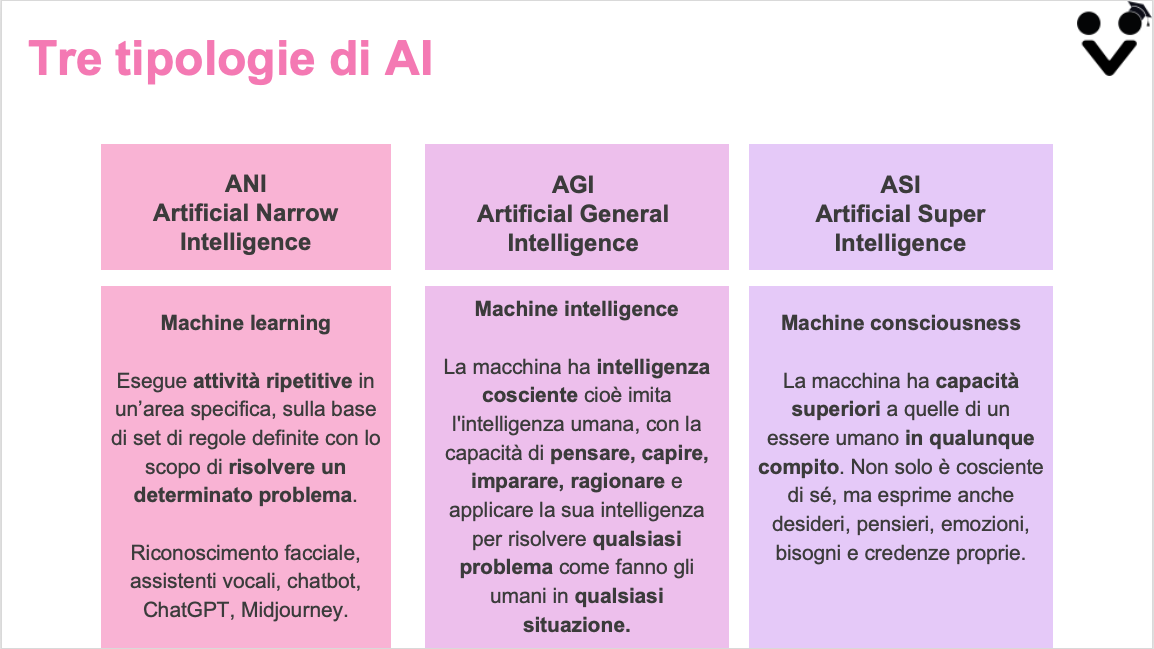
Proseguendo, Mariella ha poi delineato i vari sottoinsiemi dell'IA, aiutando il pubblico a comprendere la differenza tra AI (Intelligenza Artificiale), Machine Learning (apprendimento automatico), Deep Learning (apprendimento profondo), Generative AI (IA generativa), Natural Language Processing (elaborazione del linguaggio naturale), Computer Vision (visione artificiale) e Robotics (robotica). Questi termini, spesso usati in modo intercambiabile, rappresentano in realtà aspetti distinti e complementari dell'IA.
I sottoinsiemi di intelligenza artificiale
L'illuminante intervento di Mariella ha consentito ai partecipanti del corso di mettere le basi didattiche per iniziare a "masticare" l'alfabeto dell'intelligenza artificiale e comprenderne le varie sfaccettature.
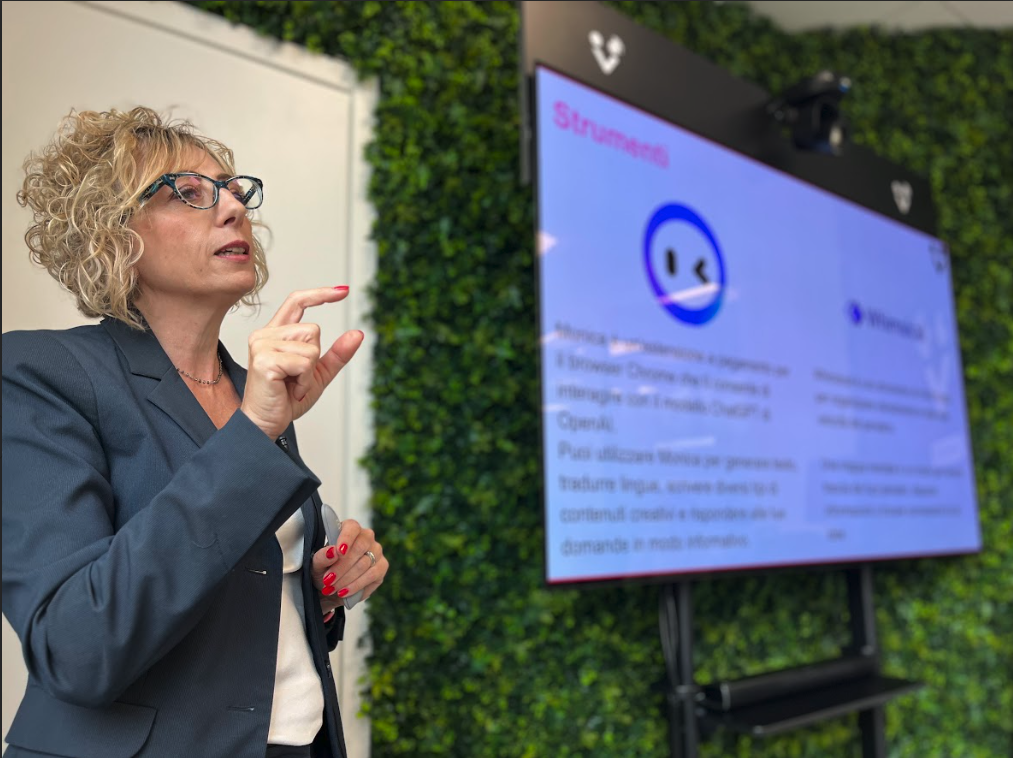
Mariella Borghi
Shalini Kuraphati e l'importanza dei DATI nel mondo dell'Intelligenza Artificiale
One of the mantras that continually emerges when talking about Artificial Intelligence is: "If there is no DATA, there is no AI"
Shalini Kurapati
During her speech, Shalini Kurapati, another distinguished speaker of the LFM University masterclass, highlighted the importance of data in training AI.

The Indian-Piedmontese entrepreneur highlighted how the quality and quantity of data are fundamental for training efficient and precise AI models. In particular, Shalini explored the concept of synthetic data, today a fundamental tool in the AI world.
But what is synthetic data and why is it useful in the AI learning process?
Synthetic data is data that is artificially generated through specific algorithms and techniques, rather than being collected from real events. This data is designed to simulate and replicate the characteristics of real data, allowing you to create large and varied data sets without the need to collect information from the real world. Using synthetic data is particularly useful in learning AI for several reasons.
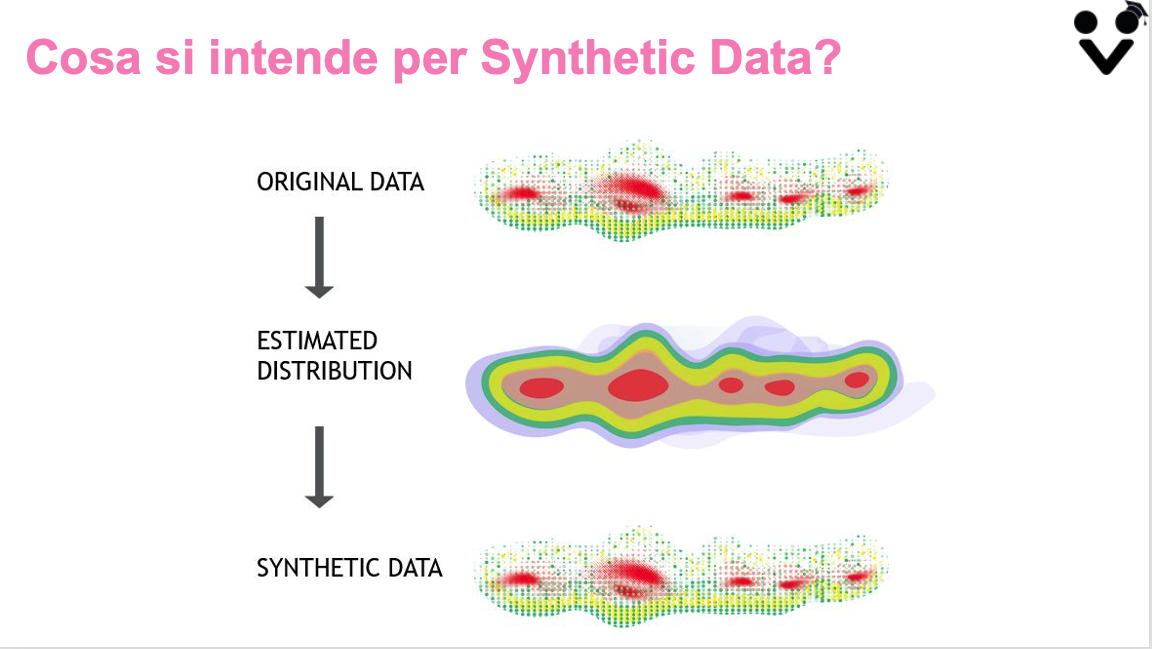
1. They allow us to overcome the limitations related to the collection of real data, which can be expensive, slow or, in some cases, impossible.
2. They offer the ability to generate specific data for particular situations or scenarios, ensuring complete coverage of all potential variables or conditions.
3. Being generated in a controlled manner, synthetic data can reduce privacy and security issues by avoiding the use of sensitive or personal data. In summary, synthetic data represents a valuable resource for accelerating and optimizing the machine learning process by providing AI models with rich and versatile datasets.
This artificially generated data can be used to simulate real situations and is particularly useful when real data is insufficient, expensive or difficult to obtain. The use of synthetic data can therefore accelerate and improve the process of training AI models.
Dayana Meijas Roman
Dayana's speech took the participants on a journey into how artificial intelligence will have a significant impact on the concept of worker as we are used to conceiving it today.
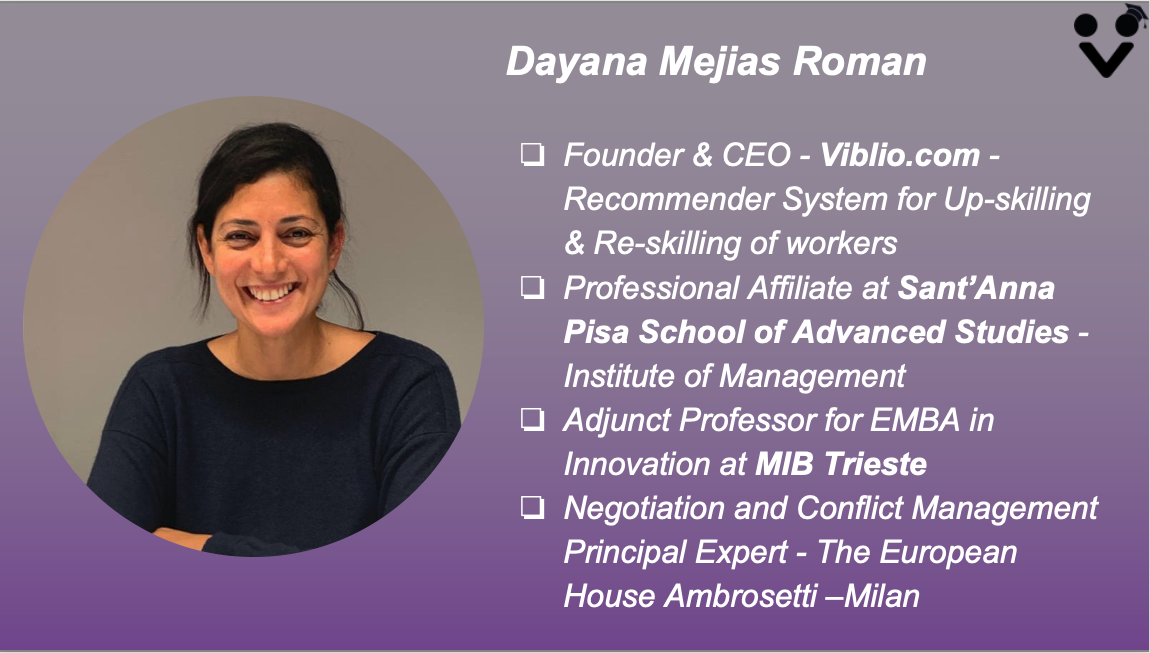
The statistics project numbers that are certainly noteworthy, it is estimated that 23% of today's jobs will change and 44% of workers' core skills will evolve drastically over the next 5 years.

It therefore becomes essential to keep up with change and embrace AI as a tool, an assistant, with which to collaborate to increase one's productivity.
But what are the characteristics that will be increasingly sought after in the workers of tomorrow?
With the advent of advanced technologies such as GPT Chat and the expansion of artificial intelligence, the working landscape is set to undergo profound transformations. The workers of the future will need to possess a number of key skills to remain relevant and competitive:
Creative Thinking: The ability to generate innovative ideas and find original solutions will be crucial, especially when machines can handle repetitive tasks.
Analytical Thinking: In addition to creativity, the ability to analyze and interpret complex data will be essential for making informed decisions.
Technology Education: A solid understanding of new technologies, including AI and Big Data, will be crucial. Not only to use them, but also to understand their potential and limits.
Curiosity and Lifelong Learning: Learning doesn't stop at formal training. Curiosity and the willingness to continue learning will be vital in an ever-changing world.
Resilience, Flexibility and Agility: The ability to quickly adapt to changes, overcome challenges and remain flexible in unexpected situations will be increasingly in demand.
Systems Thinking: Understanding how the various parts of a system interact with each other will be essential, especially in increasingly interconnected work environments.
AI and Big Data: Beyond mere understanding, the ability to work with artificial intelligence and large data sets will become a key skill in many professions.
Motivation and Self-Awareness: Intrinsic motivation and a deep awareness of one's abilities and aspirations will guide workers towards personal and professional success.
Talent Management: The ability to identify, nurture and manage talent will be crucial for organizations seeking to make the most of human resources in a technological environment.
Customer Service Orientation: Despite the advent of chatbots and AI, the ability to interact, understand and serve customers with a human touch will remain irreplaceable.
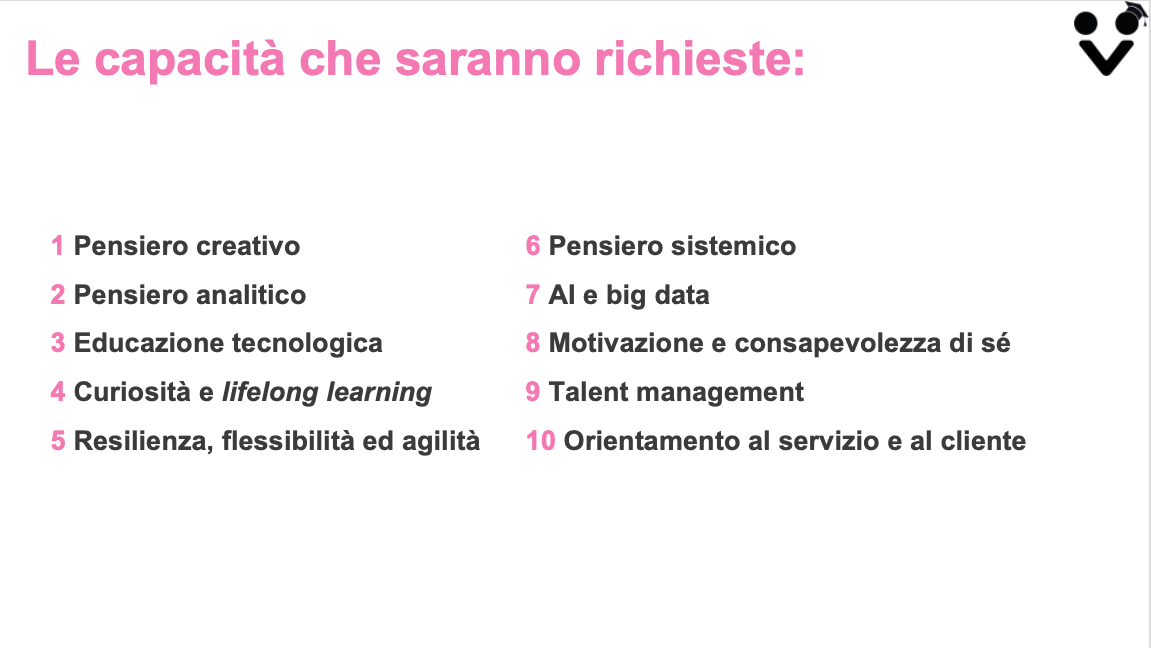
Giuseppe Mayer & productivity enhanced by AI
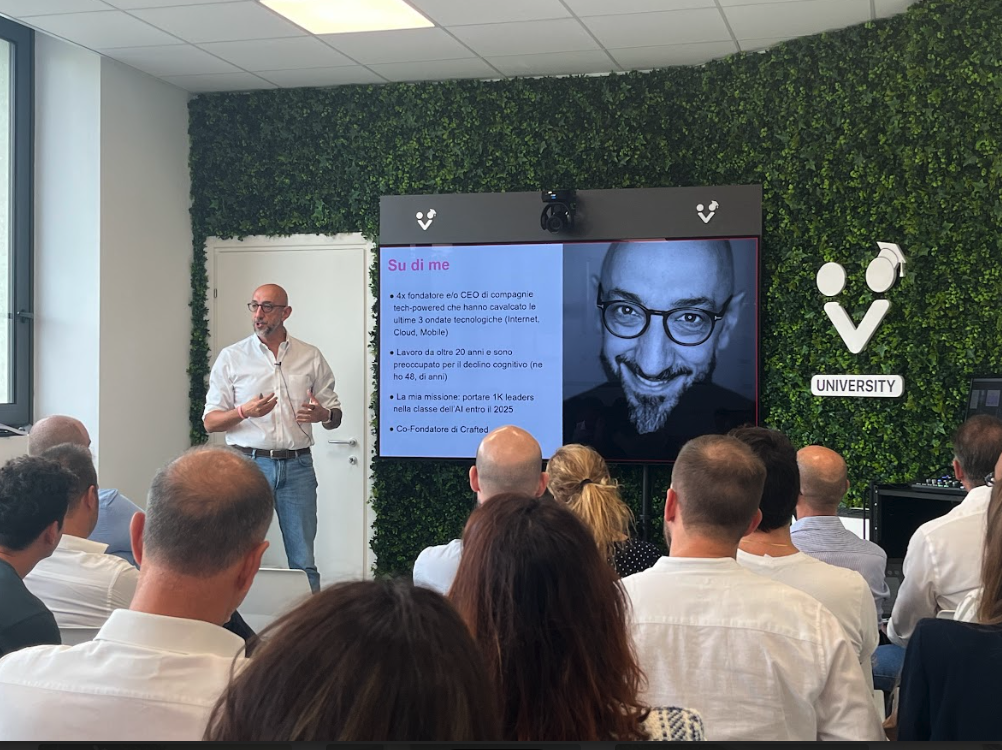
Giuseppe Mayer led the participants of the masterclass to discover the extraordinary impacts that AI can have on the productivity of all of us. Artificial intelligence can fill many roles and act as the assistant you need to take notes and summarize content, the fellow strategist who can support you in the decision-making process, or the creative person you can ask for insights and ideas.
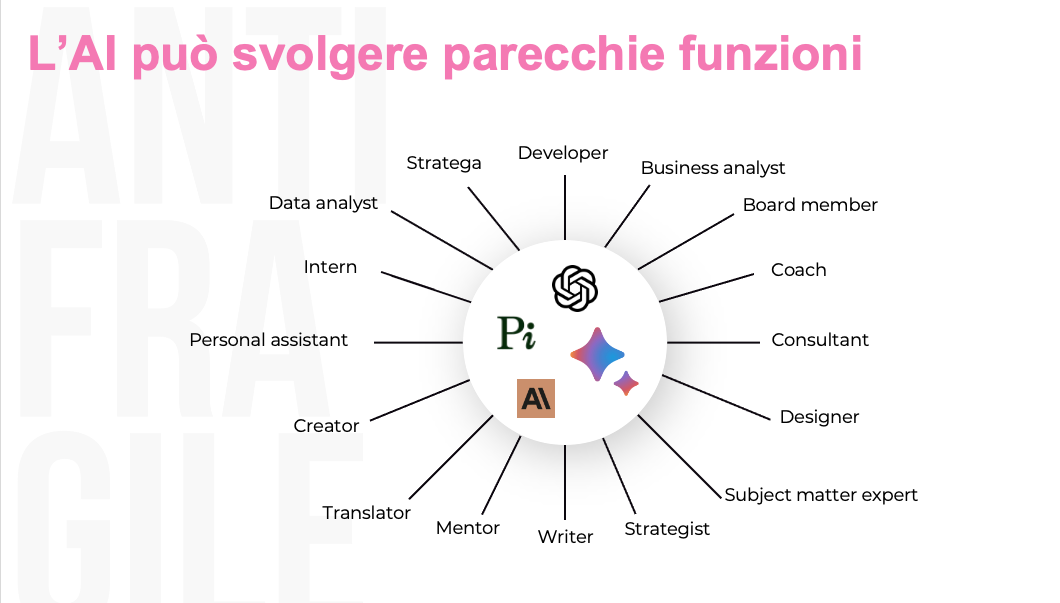
There are numerous functions attributable to AI, we must think of it as if it were a "super hero" garment which, once worn, allows us to be more creative, more analytical, more technical, more articulate.
The world of marketing will be one of the most impacted by AI and Mayer explains the 4 most relevant areas of impact:
Zero Tolerance for Inefficient Interfaces: In an era dominated by technology, consumers expect seamless and seamless user experiences. AI, with its ability to anticipate and respond to user needs, will ensure that interfaces are best optimized. Problems such as delays, errors or interruptions will no longer be tolerated, as AI will ensure an unprecedented user experience.
AI Decision Superiority: We must recognize that, in many circumstances, AI is now capable of making more informed and accurate decisions than humans. By analyzing massive amounts of data, AI can identify trends, predict behaviors, and drive more effective marketing strategies.
AI as a Time Machine for Productivity: Research by Goldman Sachs has highlighted how generative AI can act as a "time machine", projecting companies into the future in terms of productivity. According to the study, generative AI is expected to increase US productivity growth by 1.5% each year for the next decade. This means that companies that adopt AI can expect to significantly accelerate their processes and results.
Personalization at Scale Thanks to AI: Personalization has always been one of the biggest challenges in marketing. With AI, this is no longer a problem. AI-powered technologies can analyze each consumer's preferences, behavior and needs, allowing companies to deliver highly personalized experiences at scale. This means that each customer will benefit from a unique experience, shaped around their specific needs and desires.
Marcela Sabino & l'AI for innovation
In the session with Marcela Sabino we discussed how AI can be a driving force for innovation within the company.
But how does he manage to do it?
AI has immense data processing capabilities, and now that it can connect to the Internet it has access to the entire sum of human knowledge. Thanks to "Transformer technology", AI can process and analyze multiple types of large datasets (text, numbers and many others) even faster, discovering important details and trends that humans can easily miss. It can also simulate experiments, and support people in a variety of creative and innovative projects.
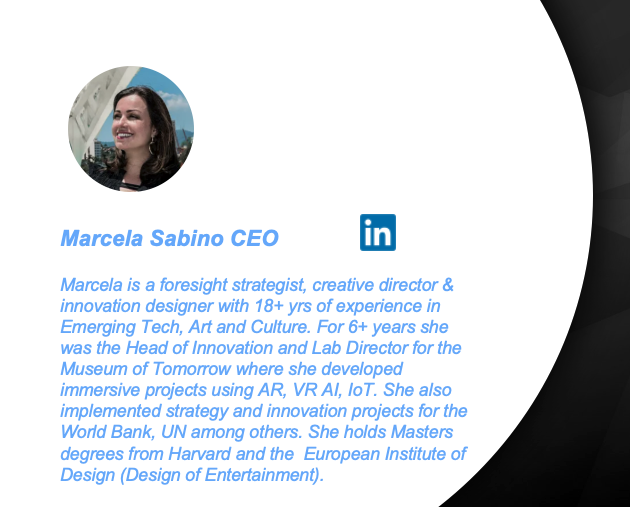
In this narrative on the innovative power of AI, Marcela led the class to understand how it can have interesting use cases within the innovation process.
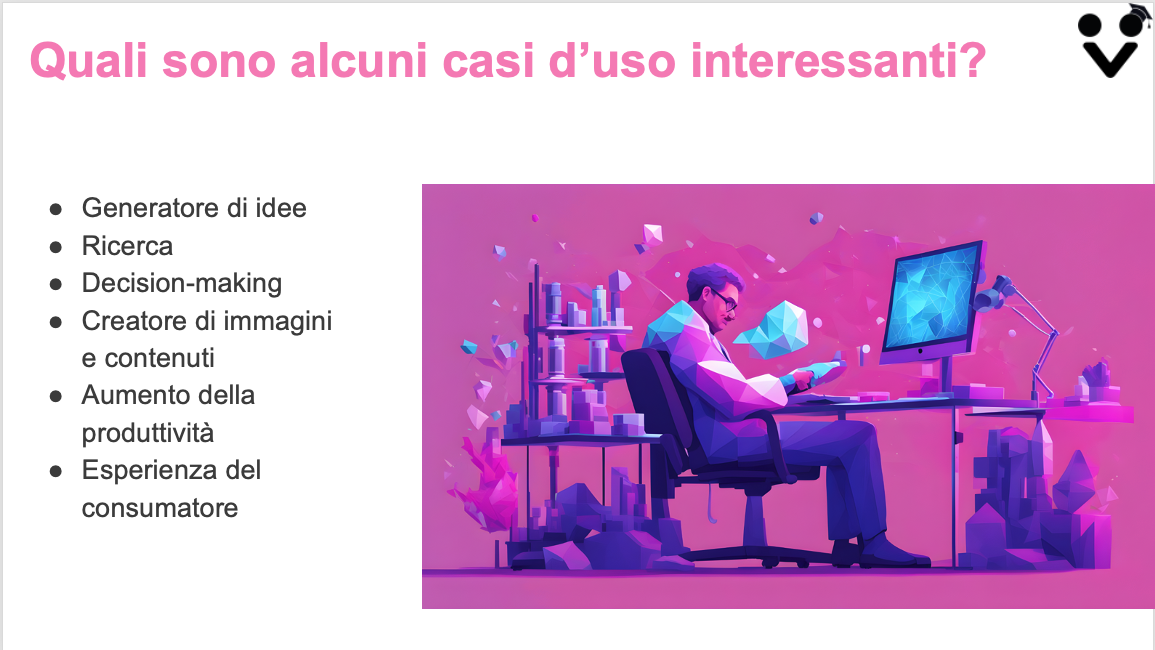
Artificial Intelligence (AI) is emerging, in fact, as a driving force in the innovation landscape, offering a range of opportunities in various sectors and phases of the innovation process:
Idea Generator: AI can serve as an idea incubator, analyzing massive amounts of data and identifying emerging trends or hidden patterns. This allows companies to anticipate market needs or devise innovative solutions before competitors.
Research Support: During the research phase, AI can accelerate data collection and analysis, quickly identifying relevant information and filtering out what is irrelevant. This allows you to reduce the time and resources spent in the research phase, making the process more efficient.
Decision Making Support: Thanks to its ability to analyze and interpret large data sets, AI can provide valuable insights that guide business decisions. This means companies can make informed decisions based on hard data, minimizing risks and maximizing opportunities.
Increased Productivity: AI can automate a variety of repetitive and laborious tasks, allowing teams to focus on higher value-added activities. This not only accelerates the innovation process, but also frees up human and financial resources that can be reinvested in other strategic areas.
Customer Satisfaction and Experience Improvement: AI can analyze customer behavior and needs in real time, allowing companies to offer personalized solutions and improve customer experience. This not only increases customer loyalty, but also becomes a source of innovation, as companies can quickly identify and respond to new market needs.
Luca Lisci and the steps necessary to carry out an AI-based project
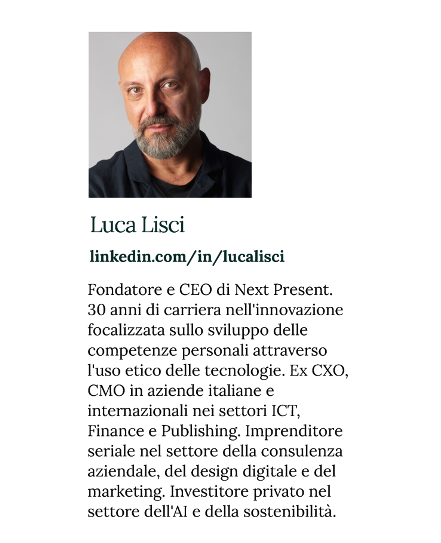
Luca Lisci, founder and CEO of Next present, whose background we have discussed extensively in previous articles on our blog, closed the masterclass by explaining to the entire audience the checklist that each company must go through before proposing AI projects.
Introducing projects based on Artificial Intelligence (AI) into a company, in fact, can be a complex challenge, given the advanced nature of the technology and the implications it entails. However, by following a methodical three-step checklist, it is possible to tackle this challenge in a structured and productive way:
Identify the Problem: First of all, it is crucial to have a clear understanding of the problem you intend to solve with AI. This requires an in-depth analysis of business needs, existing processes and potential areas for improvement. Only with a clear definition of the problem can one evaluate whether AI is actually the appropriate solution. So work to identify your "business problem"!
Evaluating Solutions and Understanding the Value of AI: Once the problem has been identified, it is essential to evaluate all possible solutions. This step involves discussing alternatives and understanding why AI might be the best choice. AI, with its data analysis and learning capabilities, could offer advantages in terms of efficiency, precision and automation compared to other solutions, but it is not always the only viable solution, so be careful to start with "all" approaches up on the AI!".
Evaluating “Off-the-Shelf” or Customized AI Solutions: Here, the decision is about choosing between off-the-shelf AI solutions available on the market or custom solutions developed specifically for the company's needs. Off-the-shelf solutions may be cheaper and quicker to implement, but may not meet all of your company's specific needs. On the contrary, custom solutions, while potentially more expensive and requiring more time to develop, offer greater flexibility and can be modeled exactly according to business needs. It is therefore necessary to carefully evaluate which path is best to take based on the available budget, needs and time available!
The workshop with industry experts to learn how to work with AI
Like any self-respecting masterclass, the "AI at the service of business" masterclass of the LFM University also included several "hands on" sessions over the two days to give all participants the opportunity to deal with artificial intelligence tools and better understand the concepts learned.
The second day was in fact characterized by numerous workshops and group work where the best AI mentors supported the various groups by co-creating suitable solutions for the various "business problems" identified and the judges Bullo and Lazzini then assessed the feasibility and goodness projects as well as coaching classes.
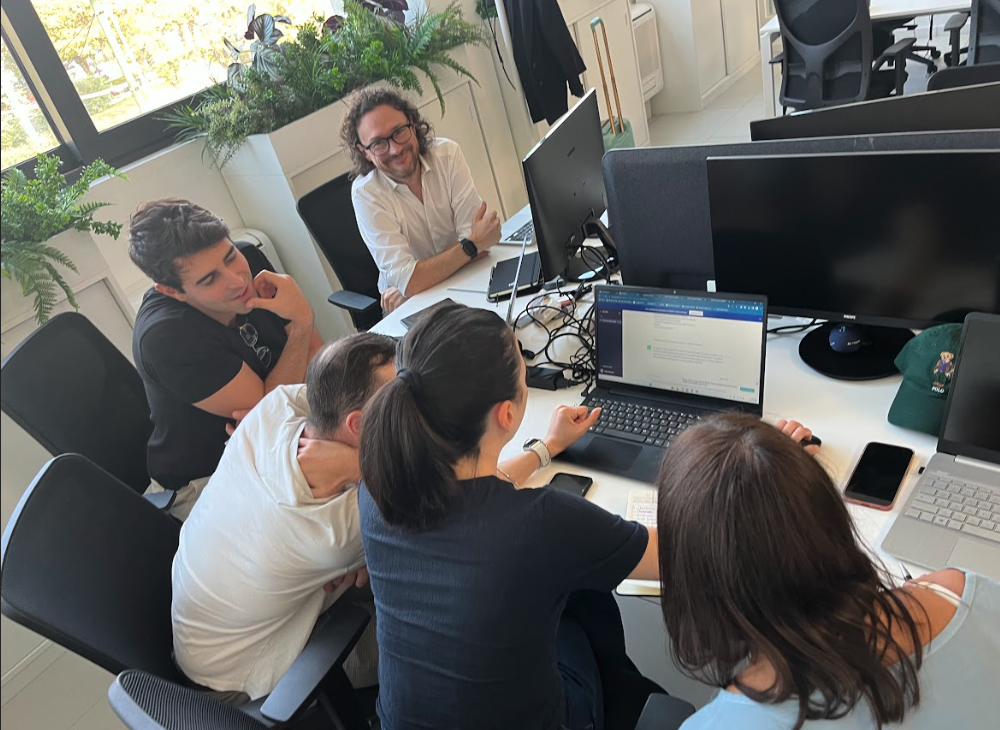
We will shortly publish the participants' comments to give you the opportunity to hear their impressions and feedback on the master directly from their words.
Stay tuned!
